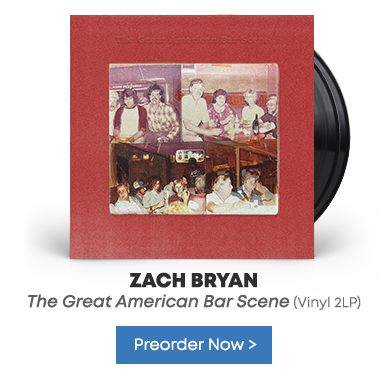Another year, another Beatles 50th anniversary. Following last year's Sgt. Pepper's Lonely Hearts Club Band reissue, this week brings us a new version of the 1968 double album The Beatles, often referred to as The White Album. Overseen by Giles Martin, the son of Beatles collaborator Sir George Martin, the revamped mix adds more oomph to the bass and drums while sharpening the overall vocal clarity. A deluxe 6LP/1x Blu-ray box set provides a bevy of outtakes and studio snippets designed to show the evolution of the songs. Yet what's most impressive about The White Album remains the way it captures the Beatles sounding like a band again. On the record, the studio and orchestral embellishments of Sgt. Pepper's get largely stripped away. And while the Beatles had long stopped touring, The White Album, for all its detours and experimentation, feels like a group playing live. Here are five of our favorite reasons to revisit the classic work.
"While My Guitar Gently Weeps"
The George Harrison-penned song, with originally uncredited guitar work from Eric Clapton, has become the former's most celebrated Beatles tune. This, despite some supposed discord during the sessions. Harrison has been quoted as saying John Lennon and Paul McCartney didn't take the composition seriously at first. But Harrison persisted, and it remains a stylish ballad with disgruntled lyrics that feel alternately studious and poetic. "I don't know why nobody told you/How to unfold your love," Harrison sings, a rebuke at its most abstract. Tonally, the arrangement seems alternately and otherworldly, as melancholic guitar notes bend, the rhythm saunters, and a deep-in-the-mix organ feels sunburnt. The song only grows more menacing as it unfolds, as jagged guitars create a sense of claustrophobia.
"Happiness Is a Warm Gun"
An odd little musical suite at less than three minutes, "Happiness Is a Warm Gun" has no doubt inspired many a raised eyebrow throughout history. Whether the title is viewed literally or as a metaphor, it can be cause for alarm. Scholars and casual fans alternately hear drug and sexual references throughout its verses, but the track endures as more than just a potentially controversial curiosity. Comprised of four distinct fragments, the tune zig-zags around various time signatures and segues from a somber, surreal opening into a lush, silly doo-wop-inspired ending. The latter arrives unexpectedly, and gives the song its most innocent soundtrack just as the lyrics become their most sexually graphic.
"Yer Blues"
Written entirely by Lennon during a Beatles retreat to India, "Yer Blues" presaged the songwriter's solo work, which followed a similar blues-based and under-polished route. The song feels rough and loose, and while the Beatles recorded multiple takes live, the end product boasts studio splicing and tinkering. "Yer Blues" also recalls the Beatles' early work, and the track feels as if it pokes fun at those old days. "Yes, I'm lonely want to die," Lennon howls in the chorus, answering no one in particular and expressing pain at its most exaggerated. Near its final verse, the song segues into a bar-band-ready strut, allowing the group a rare late-career moment to lock into a groove and jam. While it was all the rage for British bands, including the Beatles, to tap into the American blues, the Fab Four seems to do it with a wink. Here, Lennon appears to joke that things are so bad that he even hates his own "rock and roll."
"Long, Long, Long"
Another Harrison tune, "Long, Long, Long" stands as one of the album's lusher, more romantic moments. It begins quietly, soon to be interrupted by Starr's stutter-step rhythms. The pace quickens, but a Hammond organ almost immediately provides warmth. The pattern continues, giving the tune an arrangement full of comforting peaks and valleys that follow Harrison's soft vocals. The lyrics are relatively vague and sweet, and could function as those of a love song. "How could I ever have lost you, when I loved you?" Harrison sings. The artist later revealed "Long, Long, Long" was ultimately about rediscovering spirituality, but it remains relatable to anyone who has suffered a lapse in faith – either of the amorous or religious kind. Yet the arrangement conquers all, even the words, as it avoids standard verse-chorus conventions and has influenced decades of adventurous power-pop music.
"Helter Skelter"
The words "helter skelter" can feel somewhat loaded. Named after an amusement-park attraction, the song – and the phrase – was co-opted by cult-leader and murderer Charles Manson, who said it was one of many tunes on The White Album to contain hidden messages. The association with Manson endures, largely due to a best-selling book of the same name. Yet do your best to disassociate the tune from Manson. Nothing in the Beatles catalog is this loud, this intense, and this chaotic. Said to be McCartney's response to critics that he was too soft, the song remains anything but – filled with ferocious, forceful, and blunt-force guitars that sound as if they can barrel through concrete. Indeed, the sonics are so impenetrable and loaded with fuzz that "Helter Skelter" occasionally gets credited with helping to launch heavy metal. Maybe, but most importantly, it's one heck of a rock n' roll tune.
9th Nov 2018




































